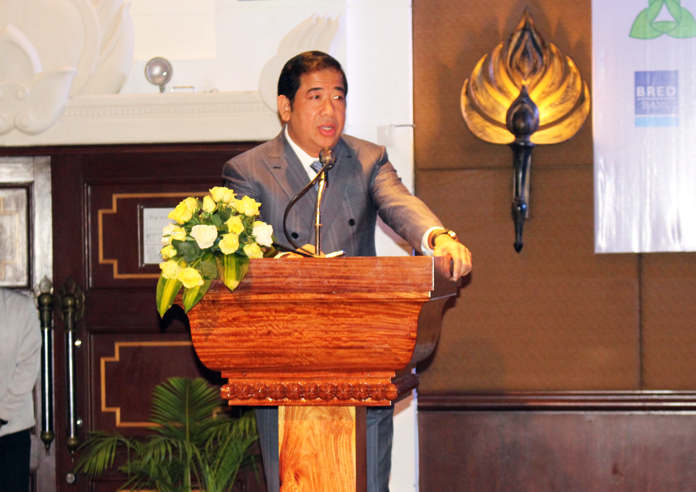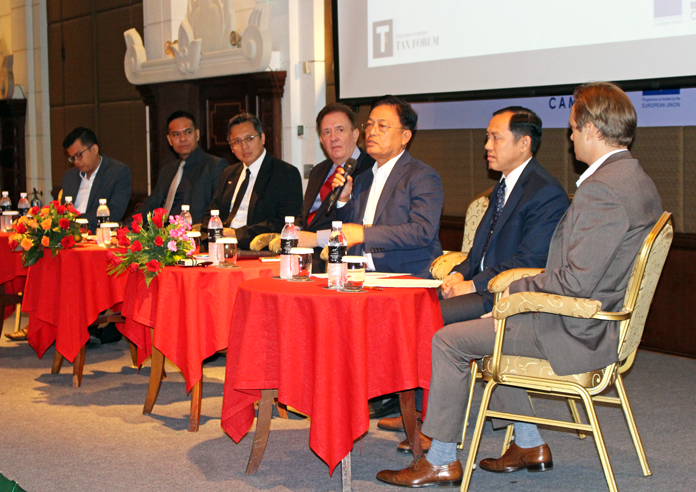Tax Reforms Swift But Challenges Remain, Kong Vibol

Kong Vibol, the director general of the General Department of Taxation (GDT), praised yesterday the swift tax reforms undergone in the Kingdom under his mandate, but stressed that multiple challenges remain, including the limited capacity of tax officials and insufficient culture of paying taxes among Cambodians.
“With four months to go until the end of the year, the GDT has already collected 70 percent of its tax target”, he said. “The system is now more professional and more user-friendly.” Vibol spoke during a tax seminar organised by the European Chamber of Commerce in Cambodia (EuroCham), which was attended by over 400 professionals, including lawyers, business owners, executives of multinational corporations and members of the press.

Vann Puthipol, GDT's Deputy Director General speaks during a panel at EuroCham's Tax Forum. The director of the GDT highlighted the importance of abolishing the estimated tax regime in levelling the playing field for business operating in the Kingdom. He discussed the street surveys currently carried out by the GDT, which, he says, will bring more business into the fold, allowing everyone to compete more fairly. He added that the current focus is on expanding the taxpayer base, and said that the GDT will avoid major amendments to the Law on Taxation in the coming years.
“We will have a new tax system after 2018. Before this, there will be no tax increases. We will just focus on expanding the base.” Vibol said they are now working on developing an e-payment system to allow business owners to pay taxes remotely. Talking specifically about the payment of property taxes, he said taxpayers will be able to pay online next year if they keep their information updated on the GDT’s website. A system to file taxes online is also underway.
Following a series of recommendations presented to the GDT in EuroCham’s White Book—a report containing policy proposals shaped by the private sector—, Vibol also said the GDT is looking into modifying the tax on insurance companies (particularly, life insurance), which currently stands at five percent, and which, he said, is “too high”. Vibol also said they are considering eliminating the one percent minimum tax for companies that adhere to Cambodia’s bookkeeping standards. “If you have proper records, we will waive the one percent tax,” he said. The one percent minimum tax is a required tax on revenue for all companies operating in Cambodia, even those that don’t make a profit. Companies that make a profit pay either a 20 percent profit tax or the one percent minimum tax—whichever is higher.
Vibol ended his presentation by stressing that despite all the improvements made to date, a number of challenges remain. “Cambodia still has a low culture of paying taxes. Through education and audits we need to increase compliance.” Other challenges, according to the head of the GDT, include the limited capacity of GDT’s tax officials and tax avoidance strategies used by multinational companies, also known as base erosion and profit shifting (BEPS).
Arnaud Darc, Chairman of EuroCham, and George Edgar, Ambassador of the European Union Delegation to Cambodia also gave opening remarks during the tax forum. Other speakers and panelist at the event included Anthony Galliano, CEO of Cambodia Investment Management and Chairman of EuroCham’s Tax Committee, Kimsroy Chhiv, Director of Tax and Advisory Services at Deloitte and Vice-Chairwoman at Eurocham Tax Committee, and Vann Puthipol, Deputy Director General at the GDP.